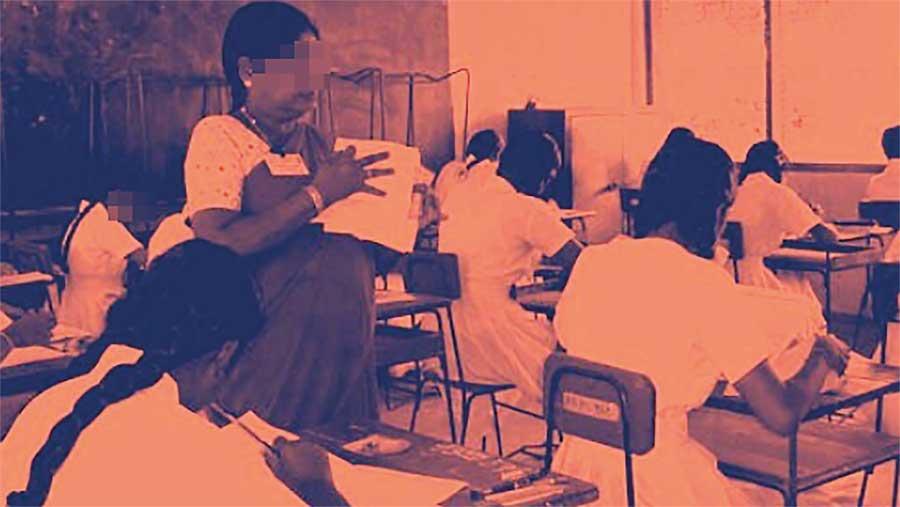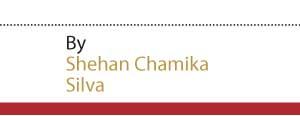A Brief Colonial History Of Ceylon(SriLanka)
Sri Lanka: One Island Two Nations
A Brief Colonial History Of Ceylon(SriLanka)
Sri Lanka: One Island Two Nations
(Full Story)
Search This Blog
Back to 500BC.
==========================
Thiranjala Weerasinghe sj.- One Island Two Nations
?????????????????????????????????????????????????Thursday, March 31, 2022
Student, denied entry for exam, wins Rs. 1 mn for emotional distress after 21 years
Supreme Court recognizes victims who have only suffered psychological trauma be entitled to compensation in civil suits

- Panicked Thushari, returned home which was hours away from the examination hall and brought back the timetable.
- When she had returned, the first part of General English paper was over.
- The invigilator had again refused to allow her to sit for the second paper as her name was initially marked as absent.
30 March 2022
In 2001, Thushari from Veyangoda Bandaranayake Madya Maha Vidyalaya was not permitted to sit for her GCE Advanced Level General English paper. An invigilator at the examination centre without even checking the easily accessible admission documents denied her entry.
However, in the following year, Thushari did sit for her missed paper. But, she sued the invigilator. 
After 21 years of legal battle, the Supreme Court recently upheld a lower court judgement and affirmed that Thushari will be compensated with one million rupees in damages. The Court held that she was deprived of sitting A/L General English paper due to the negligent conduct of the invigilator. The Bench comprising Justice Yasantha Kodagoda, Justice L.T.B Dehideniya, and Justice P. Padman Surasena gave the final judgement on February 21, 2022, regarding the matter.
Delivering a 79-page judgement, Justice Yasantha Kodagoda PC analysed a critical legal question regarding exceptional occasions general damages may be awarded in a delictual action where actionable negligence has caused a loss despite the fact that loss is not financially calculable.
Why she wasn’t allowed to sit for the paper
Thushari Ranga Mannapperuma - Respondent in the appeal, was a student who was sitting for GCE Advanced Level Examination for the second time in the Mathematics Stream in 2001. She had obtained her admission paper properly before the examination. The admission paper had two separable parts, one the admission card and the second was the exam timetable.
On the first day of the exam, her admission card was collected by the invigilator as the usual practice and returned to her the second part -- timetable. She sat for Mathematics and Physics papers at the exam centre, which was her school with no interruption.
However, on the day of the General English paper, when she came to the examination hall, seating arrangements had been changed, making it difficult for her to find her seat where her examination number had been denoted.
When she reported this to the invigilator, who had not properly checked the admission list to help her find the seat, requested her to bring the second part of the admission -- the timetable. But, it wasn’t with her. It was at her residence.
The invigilator had insisted that she bring the timetable saying otherwise she would not be able to sit for the paper. Panicked Thushari, returned home which was hours away from the examination hall and brought back the timetable. When she had returned, the first part of General English paper was over and the invigilator had again refused to allow her to sit for the second paper as her name was initially marked as absent for the first paper.
"Justice must be served by the law being adapted and enforced to cater to contemporary requirements of the administration of justice and applied in a manner to enable such victims of psychological trauma to be able to obtain general (or real) damages in the form of a solatium"
How she sued the invigilator
Thushari and her parents decided to take action against the invigilator and the Commissioner-General of Examinations, which resulted in a civil lawsuit claiming damages for the negligent act of the invigilator.
Initially, this case was decided in favour of Thushari at the District Court of Attanagalle. Later that decision was challenged by the Appellants. However, again High Court of the Provinces of the Western Province in Gampaha affirmed the Attanagalle DC judgement. Subsequently, the matter came up for the final appeal at the Supreme Court.
The Supreme Court dismissing the final appeal affirmed the District Court Judge’s stance that the invigilator should have permitted the Respondent to sit for the General English examination paper without probing whether or not she was entitled to sit for the examination paper.
How legally important the judgement is
The SC judgement says that it would amount to a violation of regulations pertaining to the conduct of examinations if an invigilator were to allow a candidate to sit for the examination without ensuring whether such candidate is entitled to sit for the relevant examination paper.
One way in which that could be ascertained would be by examining the ‘attendance register’ (also referred to as the ‘attendance sheet’) for the relevant day.
Another would be by examining the ‘admission card’ and the third method would be by examining the ‘timetable’ of the relevant candidate. The ‘attendance register’ and the ‘admission card’ of the student were in the official custody of the invigilator. Without examining either of those documents, the invigilator had disallowed the student to sit for the ‘General English’ examination paper.
Generally, in a lawsuit against a civil wrong, which is to seek a financial penalty as compensation (solatium-a thing given to someone as compensation or consolation), the plaintiff has to prove wrongful act, fault of the wrongdoer- intention or negligence, and the calculable loss.
In cases where the plaintiff has suffered psychological trauma, damages are generally confined only to situations where there is calculable financial loss. However, the following are exceptional situations where damages may be claimed as real and nominal in psychological trauma cases.
(i) Situations where actionable negligence has caused physical injury to the victim resulting in psychological trauma.
(ii) Situations where a legally recognized right of Plaintiff has been infringed by its breach or denial……. the Plaintiff will be entitled to nominal damages.
(iii) Situations where the actionable negligent conduct of the Defendant is awful in nature due to its attendant circumstances and is associated with an element of grossly unusual conduct and must therefore be condemned, he would be entitled to exemplary damages that are nominal in nature.
Therefore, it is evident that in the original and conventional sense, the damages can be awarded only if the loss suffered by the plaintiff occasioned as a result of the breach of a duty of care by the defendant, had resulted in loss and is capable of the financial assessment.
Critically analyzing the case in his lengthy judgement, Justice Yasantha Kodagoda PC said,
"Particularly in view of contemporary scientific understanding of the impact and far-reaching consequences of psychological injury and associated pain and suffering which scientists have opined far exceed in gravity in comparison with harm arising out of most physical injuries, serious consideration must be given to the anomaly and injustice arising out of victims of physical injuries who have suffered mental pain, being entitled to receive general damages and those who have only suffered a psychological injury (without having sustained physical injuries or suffered from psychiatric illness) not being entitled to receive
general damages.”
He went on to say, “should not victims who have only suffered psychological trauma also be entitled to a solatium in the form of sentimental general damages? If this is applied in the afore-stated original premise, victims who have suffered serious psychological trauma resulting from actionable negligence on the part of the wrongdoer in the backdrop of the existence of a duty of care and a breach of such duty (as in this case), fall into a substantial remediless situation.”
He further stated in the Judgement,
“Thus, it is my view that justice must be served by the law being adapted and enforced to cater to contemporary requirements of the administration of justice and applied in a manner to enable such victims of psychological trauma to be able to obtain general (or real) damages in the form of a solatium. This situation then would serve as the fourth exception to the requirement that patrimonial loss ensuing from actionable negligence should be proved by the claimant.”
“It is necessary to bear in mind that there can be circumstances in which the consequences of the infringement of a legal right cannot as in this case be assessed and determined in terms of financial criteria. That such consequences are incalculable should not in my view, stand in the way of a Court determining and awarding general damages that are justifiably due to the party whose rights have been infringed.Therefore, in my view, the quantum of damages to be awarded should necessarily be determined based on the circumstances of the case.”
In the SC case, Raveendra Pathiranage, Senior Deputy Solicitor General appeared for the Defendants-Appellants – Appellants and Dr Sunil Cooray appeared for the Plaintiff-Respondent - Respondent.
In the District Court of Attanagalle and the High Court of the Provinces of the Western Province in Gampaha, Senior Counsel Jagath Abeynayake had represented the Plaintiff.
